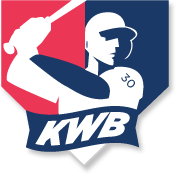This is the full version of Kevin Wilson’s “Directional Hitting” segment on KWB Radio podcast in 2014.
Joe Ferraro (host) – “We only have 5 minutes, so tell me what you know about “Directional Hitting,” what the heck it is and how it’s going to make our hitters better.”
Kevin Wilson: “I like to tell guys, hey listen, the ball comes from 60 feet, 6 inches straight in front of you. And a lot of guys tend to “leak off” the ball, open the front shoulder, fly open – all of the terms that you hear on a daily basis.
There is a lot to trying to be directional and as a hitter you’re trying to slow the game down. You’re trying to make sure you’re “staying in your lane” so-to-speak. So I like to break it down this way.
I like to start with taking the old “rubber band theory.”
I’m in the back of the classroom with a rubber band in my hand and I say to myself, “I’m going to hit that blackboard or these days the smartboard.” I’m going to take this rubber band and try and snap one off and hit the smartboard.
Ok. How am I going to do that?
Well obviously, I have to get the rubber band and I gotta pull it all the way back before it snaps – to the furthest point back I can – and what am I going to do? Line it up to where I want to shoot it. Now when I let that rubber band go, Joe, I’m not going to be worried about what direction it’s going. At that point when I let it go, it’s just a matter of if it’s going to hit the board or not.
And so that’s why I like to paint that picture of directional hitting.
So I pointed that rubber band in a direction knowing that when I let it go, it’s going in that direction. So when the ball’s coming from 60 feet, 6 inches in front of me, when I get ready in the box, I want my shoulders, my hips, everything pointed directly at where that ball is coming from.
And so, sometimes we leak off and we go to shortstop or second base (depending if we are right handed or left handed). Because it’s coming from straight in front of me, I’m going to get my load (pull the rubber band back) and I’m going to be able to get myself in line, so when I let that swing off – let that rubber band go – my swing (aka the rubber band) is going to be able to stay up the middle and stay directly to where the ball is coming from.
So in a nutshell Joe, that’s what I like to paint a picture of to guys is that I have to get on time early enough to be able to line myself up – shoulders, hips, everything like the rubber band – and that when I come down to be able to swing, I’m still staying up the middle because I’m not rushed.
Most of the time when we are rushed and not on time, we tend to fly open because we have to get everything out of the way just to get the barrel there. So this allows us to be on time better. This allows us to get ourselves lined up to where we want to hit the ball in the hitting zone and allows us to ultimately stay through the baseball.
So if we are lined up right, we got our good direction, the rest takes care of itself.
JF: I learned something today, I gotta tell you.
KW: Well it’s not everyday that you do that.
You can listen to the 5-minute episode in its entirety here:
For more than a decade, Kevin Wilson has been one of the most respected hitting coaches in the game. He works behind the scenes as a private hitting consultant to some of the best hitters in Major League Baseball. In 2013, Kevin was the hitting coach for the USA Baseball 18U National Team. Team USA beat Japan for the Gold medal at the IBAF World Cup in Taichung, Taiwan.
He is the author of two (2) Amazon #1 Best Sellers The #GoodBatting Book and Finding Clarity: A Mindful Look Into the Art of Hitting and co-hosts a popular podcast, KWB Radio, that showcases unique conversations with the pros. If you want Kevin to speak at your next event or if you want take advantage of his popular 2-day KWB Experience for players and coaches, contact Kevin today!
Follow Kevin on twitter @KWBaseball and visit his website KWBaseball.com
